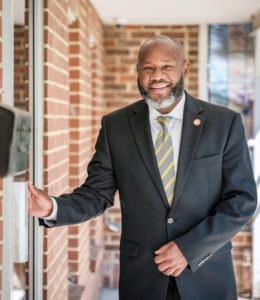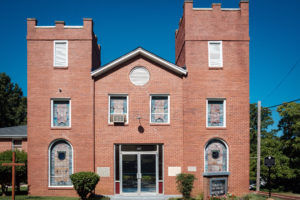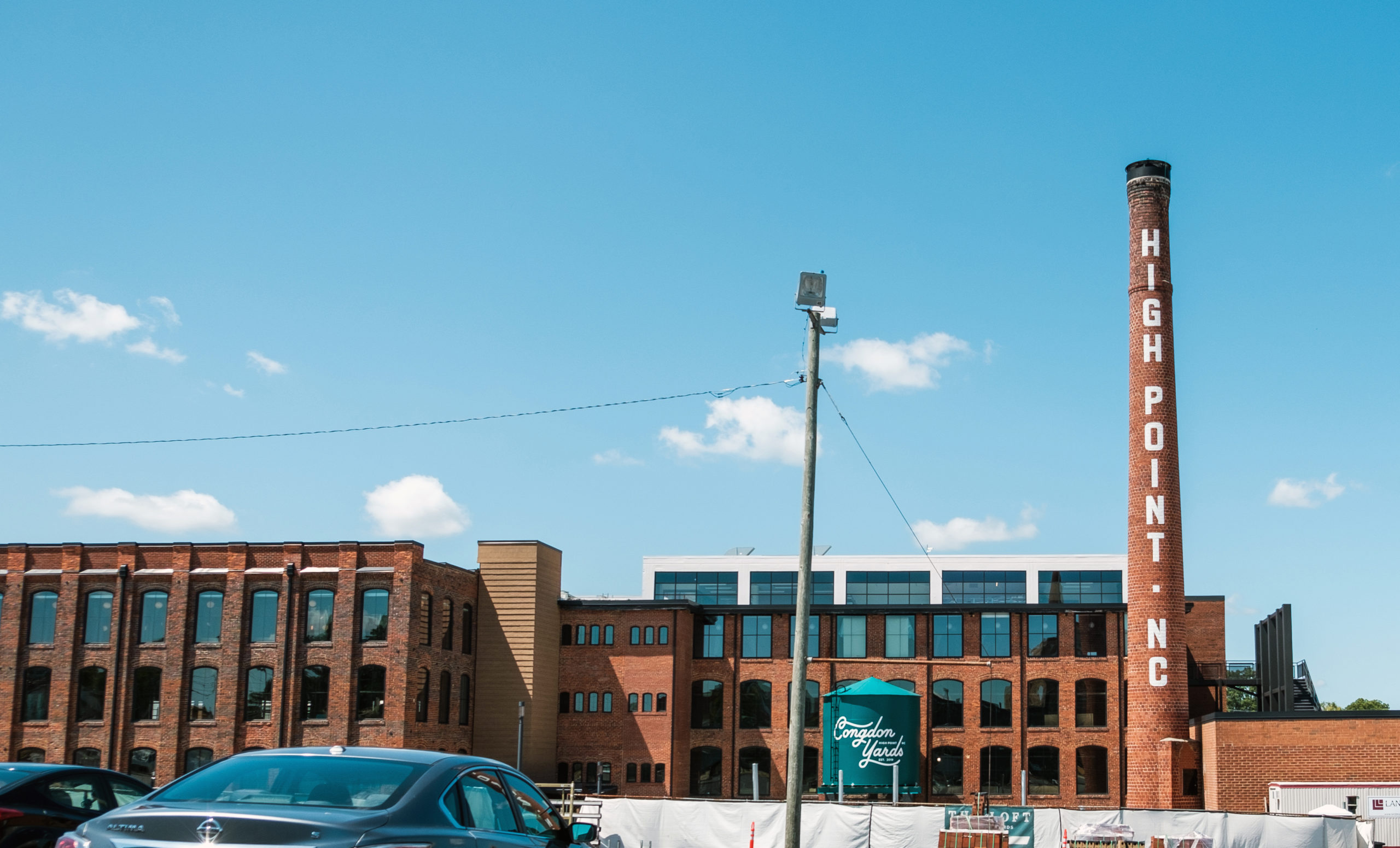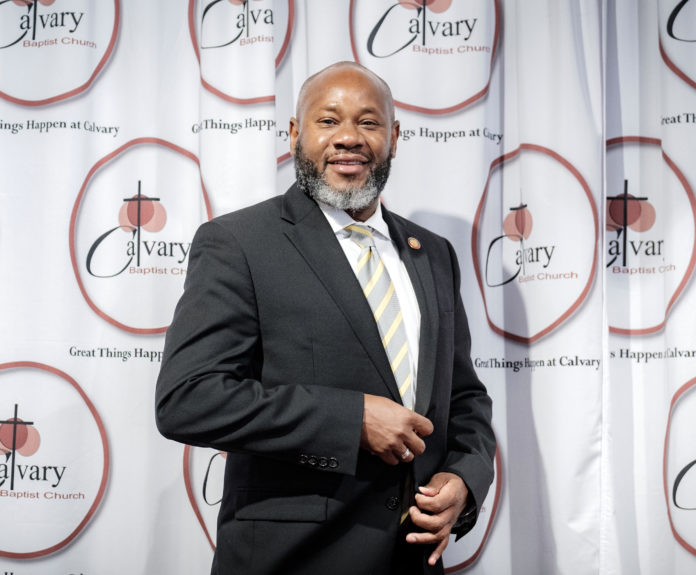The League’s Quarterly Legislator Q&A
Meeting State Rep. Amos Quick at his vocational office was enough on its own, without a word yet spoken, to convey his deep connections to well-being and human potential. Quick is a pastor, and his office is within Calvary Baptist Church on Hilltop Road in High Point, where a sign outside bears Quick’s name, welcomes congregants and proclaims that “Great Things Happen” inside. Each Sunday, Pastor Quick has the opportunity to click with the congregation and understand members’ varying needs and places in life, a community context that layers well with his broader community callings and optimism for positive outcomes. Rep. Quick invited Southern City inside for some Q&A about the 2022 legislative short session, what cities and towns can do in such dynamic times, and why he has faith that North Carolinians are in for bright futures, despite some sharp divisions in the population.
˘˘˘
Let’s start with the 2022 short session—your general thoughts on it?
AQ: Well, I was pleasantly surprised at the brevity of the short session, particularly with there being so many hot button issues that came up during the time that we were in session and how we could stay focused on budget corrections in that time frame. Not a lot of headline-making policy decisions. There were some, but we mostly stayed away from the major hot button issues. I think with the budget corrections, we could have done a lot more. I think there could have been more investment into our recovery out of the pandemic. So again, I was pleasantly surprised at the brevity of it. But also, a little bit disappointed that we weren’t able to do a little more as far as helping North Carolinians coming out of this pandemic.
What ideas or policies are on your mind?
AQ: Medicaid expansion absolutely has to be mentioned in any discussion when you’re talking about North Carolina politics. It is amazing that, even going through a global pandemic, we didn’t have enough motivation to expand Medicaid, with the hundreds of thousands of North Carolinians who don’t have Medicaid insurance coverage… And then, policy decisions—first of all, we’re not completely out of the pandemic—policy decisions that keep us safe and that we can make investments into making sure that we continue to stay safe as we navigate our way through this pandemic. Then also with the over $6 billion in opportunity dollars that we have; that’s what I call them: opportunity dollars.
 You mean the state’s fund balance?
You mean the state’s fund balance?
AQ: The fund balance that we have. Of course, saving for the rainy day, but also making investments that continue to move North Carolina forward.
How about with the state’s cities and towns?
AQ: I think cities and towns must plan for the future at a rate that perhaps we haven’t been doing before. As we begin to come out of the pandemic, the one thing that we have to realize is we’re not the same. We’re different. New issues have been identified. New ways of dealing with issues have been identified. Some people who have been in the shadows have come out of the shadows, and we see them. And how do we deal with the issues that they bring forth? What does the future look like? We have young people—I have two daughters, 30 and 31 years old. They’ve never known anything but stress and turmoil and chaos and confusion and they see the world differently than I do. They lived through September 11, they lived through the war on terror, and you come out of that and you have the Great Recession, and you come out of that and you have the coronavirus pandemic. They’ve not had an opportunity to breathe, and I think that makes them think differently and expect differently from government. Whether it be local government, state government, or federal government, the expectation is different. Is the government going to help us? Or has the government said, “You’re on your own?”
What do you think cities and their leaders can focus on to help?
AQ: Infrastructure is important. Affordable housing is always going to be important. I think that cities must do things to not add to the divide that’s happening between haves and have-nots. We’ve forgotten about the middle class to a large degree, and cities can do things to help promote the growth of the middle class. I think cities need to consider that it’s the citizens that pay for things … and citizens expect some return on their investment into our system, and for it not to go to the already wealthy when we see areas of our cities that are becoming more unsafe. Crime definitely has to be a consideration. How do we combat crime? While not saying that the only answer is let’s add more police officers. Because the truth of the matter is not a lot of people are going into law enforcement. So, what do we do to keep communities safe and not rely so much on law enforcement and that one-size-fits-all answer to the issues? That demands a further delving into the issues. So, we have a crime, and we have a person who has committed a crime, and that person must deal with the consequences of that. I’m certainly not saying we take away consequences, but we also delve into the data of the specific areas of our cities where this is more of a problem than other places. How do we fix that? And not just turn a blind eye and put some uniforms and some guns into these communities—and I’m talking about law enforcement. That just doesn’t work anymore. Not only are we losing people and property when you talk about murders and property crime, but there is tremendous brain-drain that we’re not tapping into. There are people in these communities who have some solutions and will tell us what could work.
 Speaking of community, we’re sitting in the church where you pastor, in a place where people similarly come for answers. How did you come to that?
Speaking of community, we’re sitting in the church where you pastor, in a place where people similarly come for answers. How did you come to that?
AQ: It’s truly a calling. The longer I’m in it, the more I realize it is absolutely a calling. It is not something for someone to choose. If you’re not called into it, it’s not what it looks like. We can talk about it in the same breath as dealing with the issues of our community. Every Sunday, as I look out over the congregation, there are people there in need of something. It could be a spiritual need, financial need, emotional need, relational need—they’re coming because they’re in need of something and the church has to be part of the solution for our wider community. Particularly the Black church. If you look at what the Black church has meant to this nation, colleges and universities have come out of the Black church, social safety nets have come out of the Black church. Then you look at church in general. The church has been a social safety net. We’ve fed people, we’ve clothed the naked, we’ve provided childcare for families. And so, the church has a part to play in the development of our communities, but it’s getting more difficult because the data says that fewer and fewer people are engaging with the church.
Is there a natural bridge from there to your focus on elected office?
AQ: I spent 12 years on the Guilford County Board of Education. And my initial run for office is because I was a youth development professional and was a chief administrator for the Boys & Girls Clubs and eventually CEO of all the Boys & Girls Clubs in Greensboro. And I just felt that there was a role that I could play in helping to develop youth, and so I ran for the school board. After being on the school board for 12 years, I realized there are some decisions that come down from the state level to the local level. Mandates that the school board has to function under, and they don’t necessarily match the reality that’s on the ground. So, I said I’d run for state House. But in running for state House—and I’ve absolutely enjoyed being there—some of the policies that I think would be effective have been enacted, educationally. But I think there’s more that could be done. And I think that being in the minority party, and being able only to yell and complain about the direction, I would absolutely love to be in the majority and have some of these ideas that I think would absolutely work, see how they play out in the education of our children.
 How do you convey your ideas and local government experience to fellow lawmakers who might come from different angles?
How do you convey your ideas and local government experience to fellow lawmakers who might come from different angles?
AQ: Just never stop bringing it up. You just never have to stop pointing at your resume, almost. “I know something about this,” whereas you may know something about that, and I need to listen to you on that issue. For example, the environment; I’ve been educated on environmental concerns to a degree that I didn’t have when I first came there. But I know some things, too, particularly about local government and education and how decisions affect people at the local level. You just have to keep bringing it up. Let’s look at the actual implications of what the decision may be. You have to keep lifting your voice up. Never saying, “Well, it’s not going to happen.” Surrendering, almost. You never surrender. You continue to lift your voice. You continue to bring your ideas forward and recognize that because there’s a diversity of thought and opinion and intelligence at the General Assembly, my ideas can be tweaked into better ideas… The fearful thing that we all see happening in this state and in this nation right now is people are just making a determination based on political party or something that doesn’t allow for us to have the great intelligence of North Carolina play itself out. With my Republican colleagues, the one thing that I try to do is to listen to where they’re coming from and hear where they’re coming from. We can disagree all day. But I think that the main thing that we have to do is to keep in mind that we’re all trying to get to a certain place. We just disagree on the way to get there. But I think we’re losing that. I think that we’re not even trying to get to the same place anymore. I think that we’ve come to this place where “our idea is the best idea, and if you’re against our idea, then forget about you, we’re gonna run roughshod over you and your ideas and our idea is the only idea that gets championed.” You’re never going to win with that.
What’s your personal background? Are you native to this area?
AQ: I am. I grew up in Greensboro, I graduated from Dudley High School, I’m Guilford County born and bred… I love Greensboro.
What does your connection to your community do for your style or views on public service?
AQ: I think as the third largest city, Greensboro is often overlooked on the state level. And so, myself and our delegation, we try to make sure that, hey, don’t forget, we’ve got a lot of people living in Guilford County as well. So, let’s not forget about that. I also think the profile can be raised. We’re called the Gate City for a reason. You look at our major interstates in North Carolina: I-40 and I-85 come through Greensboro. We are the Gate City for a reason. And so, I’m a homer in that respect. And I want to see Greensboro’s profile be raised, because I believe it also raises the profile of the state, and what benefits Greensboro will benefit North Carolina. High Point as well. We’re sitting here in High Point, where I pastor. We’ve got the furniture market here. But that’s not all that’s in High Point. High Point has a great manufacturing tradition and history, and I’d like to see those jobs come back. If those jobs aren’t coming back, then we have a great opportunity to invest in the education and workforce training for the citizens of High Point. We have over 100,000 people living and working in High Point. Just think about what happens if you lift the profile of High Point other than the furniture market? We don’t want to lose the furniture market. In fact, we want to enhance the furniture market. But we also need some workforce training and development. We’ve got some things happening around here with the megasite coming, and then we’ve got the car manufacturer down in Chatham County, which is not too far of a drive from here. So, things are happening. But we have to train the workforce so we can be able to take advantage of some of those opportunities. And rebuild the middle class. When we were a manufacturing community, in Greensboro and High Point, there was a middle class. Cone Mills developed a middle class. My grandparents worked at Cone Mills and provided a comfortable living. By no means were we rich; we were probably categorized as the working poor, but we were working. Some of my family was able to go to college because of my grandparents working and having a stable income. Same in High Point … where people could look forward to the next generation having a comfortable living. Comfortable—again by no stretch wealthy, but a comfortable living. There was a stepping stone to upward mobility and we just don’t have that anymore. We have almost a sense of despair because there’s no middle class. It really becomes depressing, and a situation with a lot of despair, and we don’t have to go there. We’re a great state, we’ve got a great history, we can build on that history and build a great future, but we all have to work together, and we have to get rid of this division that is now falling on political party, to a degree that is quite frightening, to be honest with you.
Do you see us coming out of it? Out of these divisions? Do you see a brighter future where we’re working together in a better way?
AQ: As a pastor, I have to have hope. I preach hope. I preach faith and I preach hope. And so, I do have hope. And I think that happens—it sounds cliche, but it is true—when we focus on what we have in common more so than what divides us. I don’t know of anyone who doesn’t want their children or grandchildren to have a better life than what they had. We all have that in common. That’s an ideal we all have. We all want safe communities. I don’t know anyone who says, “I don’t want to live in a safe community.” We have that in common. What divides us and has been exploited is: we disagree on the way to get there. I think if we focus on the goal—the goal is safe communities, well-educated population, and the chance for everyone to reach their full potential as North Carolinians—I think if we focus on that, then what we have in common will prevail. How we get there is we just never stop hammering that message home. We never stop keeping the goal as the main thing. We can do it. I have hope that we can do it. This dark period that we’re in right now? It has a shelf life. We have to see the light. That’s something that sounds pastoral, and in a lot of respects is, but it’s the truth.














